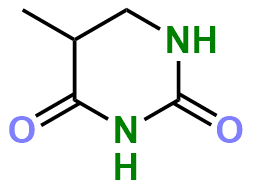Dihydrothymine Analysis Service
- Qualitative and quantitative analysis of dihydrothymine content in biological samples.
- Evaluation of DNA damage and repair mechanisms.
- Supports drug discovery and development, particularly in anti-cancer and anti-viral therapies.
- Animal tissue: ≥ 100 mg
- Plant tissue: ≥ 200 mg
- Serum/ Plasma: ≥ 200 μL
- Urine: ≥ 2 mL
Dihydrothymine is a reduced derivative of thymine, a pyrimidine base that is an essential component of DNA. Its structure consists of a thymine core in which the double bond between the carbons at positions 5 and 6 has been reduced, resulting in a dihydropyrimidine ring. This compound is primarily known for its role in the catabolic pathway of pyrimidine metabolism, where it is formed from thymine by the action of the enzyme dihydropyrimidine dehydrogenase (DPD), which catalyzes the initial and rate-limiting step in thymine degradation.
Dihydrothymine is commonly used in research to study pyrimidine metabolism, especially in relation to the degradation and recycling of nucleotides. Although dihydrothymine itself is not widely used as a therapeutic agent, understanding its formation and breakdown can provide insight into the management of disorders associated with pyrimidine metabolism, such as dihydropyrimidine dehydrogenase deficiency and certain types of cancer. It is frequently measured in clinical studies to evaluate the activity of pyrimidine catabolic enzymes, which is important in pharmacogenetic research, particularly regarding the metabolism of drugs like 5-fluorouracil.

Figure 1. The Structure of Dihydrothymine
MtoZ Biolabs is proud to offer our advanced Dihydrothymine Analysis Service. Leveraging our state-of-the-art liquid chromatography-mass spectrometry (LC-MS) platform and the expertise of our metabolomics team, we provide a comprehensive analysis of dihydrothymine with unparalleled sensitivity and precision.
Analysis Workflow
Service Advantages
1. Continuously refined protocols and cutting-edge analytical tools
2. Expert experimental planning
3. Rapid processing times
4. Exceptional precision, selectivity, and sensitivity
Applications
Sample Submission Requirements
1. Sample Types
Serum, plasma, urine, tissues, and other biological samples. For each sample type, at least three specimens in the same condition are required.
2. Sample Volume
3. Sample Preservation
To maintain stability, samples should be stored at -80°C.
Please provide details about the sample collection and handling process.
Deliverables
1. Experimental Procedures
2. Relevant Liquid Chromatography and Mass Spectrometry Parameters
3. Detailed Information on Dihydrothymine
4. Raw Data
5. Custom Analysis Report
Our Dihydrothymine Analysis Service is designed to meet the highest standards of reliability and accuracy, thus accelerating your research and product development endeavors. We are committed to providing high-quality and professional services tailored to your specific needs.
How to order?







